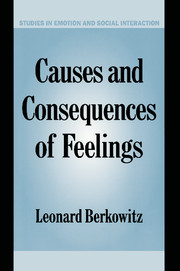7 - Feeling Effects on Aggression and Helpfulness
Published online by Cambridge University Press: 28 October 2009
Summary
In one way or another, the previous chapters dealt with the influence of feelings on thought processes. We will now take up the effects of mood on two kinds of social behavior. The chapter will first consider the role of unpleasant affect in generating aggressive inclinations, and then, to end on a more positive note, we will look at the ways in which good moods facilitate good behavior.
Hostility and Aggression
The Influence of Negative Feelings on Anger and Aggression
Before we get underway, however, let's look back at what's been said about the psychological consequences of negative feelings. First, in introducing you to Bower's associative network model of affective influences, I cited the evidence demonstrating a frequent mood congruence: People who are feeling bad often have bad memories and negative ideas and are also apt to judge things unfavorably. On the other hand, my discussion of the MAI formulation also noted that negative affect can lead to careful, analytic thinking, so that the evaluations made are relatively free of stereotypes and preconceived notions.
These observations aren't necessarily incompatible. In Chapter 5, I suggested that the influence unpleasant feelings have on judgments depends largely on the intensity of this affect, as well as persons' level of mental activity and the strength of their disposition to make accurate assessments. Simply put, people who are in a negative mood are most likely to engage in analytic information processing, and not express opinions consistent with their bad mood, when this feeling isn't too intense, they're mentally active, and they're motivated to make an accurate (or fair) evaluation of the given target.
- Type
- Chapter
- Information
- Causes and Consequences of Feelings , pp. 167 - 190Publisher: Cambridge University PressPrint publication year: 2000

